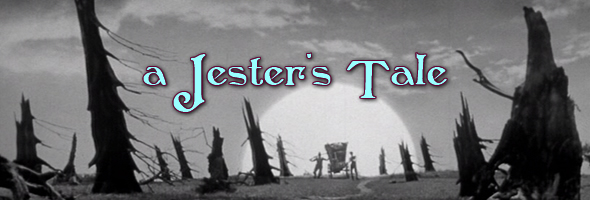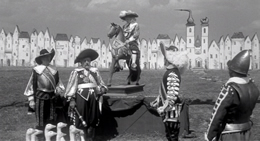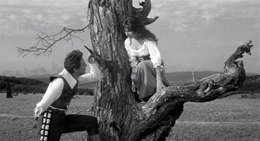
B&W, 1964, 82m.
Directed by Karel Zeman
Starring Petr Kostka, Emília Vásáryová, Miroslav Holub, Valentina Thielova, Karel Effa
Second Run (DVD) (UK R0 PAL) / WS (1.85:1)

B&W, 1964, 82m.
Directed by Karel Zeman
Starring Petr Kostka, Emília Vásáryová, Miroslav Holub, Valentina Thielova, Karel Effa
Second Run (DVD) (UK R0 PAL) / WS (1.85:1)
 Czech filmmaker remains one of the most creative animators in world cinema, with his still-striking and often witty use of live action and hand-drawn
Czech filmmaker remains one of the most creative animators in world cinema, with his still-striking and often witty use of live action and hand-drawn  creations enlivening such fantasy favorites as The Fabulous Baron Munchausen (1962) and the deliriously inventive The Stolen Airship (1967). Both have become repertory favorites over the years, but in between those two he delivered an unexpected satire set during the Thirty Years' War of the 17th century. However, the film itself still delivers bucket loads of the poetic visuals, rapid-fire narrative twists, and charming personality of his more fanciful tales, with fantastical touches involving the forces of fate still keeping this firmly in Zeman territory.
creations enlivening such fantasy favorites as The Fabulous Baron Munchausen (1962) and the deliriously inventive The Stolen Airship (1967). Both have become repertory favorites over the years, but in between those two he delivered an unexpected satire set during the Thirty Years' War of the 17th century. However, the film itself still delivers bucket loads of the poetic visuals, rapid-fire narrative twists, and charming personality of his more fanciful tales, with fantastical touches involving the forces of fate still keeping this firmly in Zeman territory. Matej (Holub). Together they swipe a nearby donkey and use it to transport a coach filled with the golden spoils of war; joining them along the way is Lenka (Vásáryová), the donkey's owner, who takes on the disguise of a jester when they become prisoners in the dungeon of an enemy castle. Identity confusion has them identified as nobles and soon moved back upstairs as royal guests, with Petr becoming the next husband in line for the capricious Countess Veronika (Thielova). Needless to say her current fiance, Captain Vargas (Effa), isn't too thrilled with the development, and more mayhem quickly ensues.
Matej (Holub). Together they swipe a nearby donkey and use it to transport a coach filled with the golden spoils of war; joining them along the way is Lenka (Vásáryová), the donkey's owner, who takes on the disguise of a jester when they become prisoners in the dungeon of an enemy castle. Identity confusion has them identified as nobles and soon moved back upstairs as royal guests, with Petr becoming the next husband in line for the capricious Countess Veronika (Thielova). Needless to say her current fiance, Captain Vargas (Effa), isn't too thrilled with the development, and more mayhem quickly ensues. 
 famous films, the UK DVD release of A Jester's Tale (usually referred to as The Jester's Tale) from Second Run marks its English-subtitled debut in any format. The new anamorphic transfer looks very impressive, and apart from a bit of print damage here and there, the elements appear to have been kept in fine shape. Black levels look dead on, and the optional English subtitles are well written and engaging. The disc itself is bare bones, but the package includes a 12-page booklet with an extensive essay by the TCM International Guide's Ian Haydn Smith. He does a fine job of covering the state of Czech cinema at the time and the career of Zeman, whose achievements could easily fill a book. Hopefully this means more of his marvelous work will be more widely available to English-speaking viewers, who still haven't seen anything else even remotely like him.
famous films, the UK DVD release of A Jester's Tale (usually referred to as The Jester's Tale) from Second Run marks its English-subtitled debut in any format. The new anamorphic transfer looks very impressive, and apart from a bit of print damage here and there, the elements appear to have been kept in fine shape. Black levels look dead on, and the optional English subtitles are well written and engaging. The disc itself is bare bones, but the package includes a 12-page booklet with an extensive essay by the TCM International Guide's Ian Haydn Smith. He does a fine job of covering the state of Czech cinema at the time and the career of Zeman, whose achievements could easily fill a book. Hopefully this means more of his marvelous work will be more widely available to English-speaking viewers, who still haven't seen anything else even remotely like him.![]()